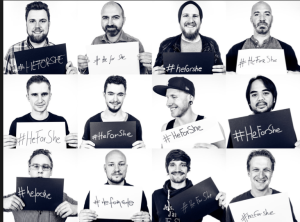#HeforShe aims to give feminism new edge
Chances are, you’ve heard of Emma Watson’s #HeforShe speech at the United Nations on Sept. 20. This address centered on a major, popular falsity that feminism is all about raging a war against men and creates an intense dichotomy of women against men. This is an inaccuracy that needs to be clarified and as Watson proposes, men must realize that feminism is an issue that affects them, too.
Watson, a Goodwill Ambassador for UN Women, used this speech to launch her campaign #HeforShe that highlights this core idea. A Twitter storm ensued after her talk called on men to join the force against our engrained societal gender structures. “We don’t often talk about men being imprisoned by gender stereotypes but I can see that that they are and that when they are free, things will change for women as a natural consequence,” she said.
The stereotype of woman’s characteristics — meek, obedient, overtly feminine – is perpetuated because it carries with it and is contrasted by what is deemed as the ideal man – aggressive, confident, brave. Too much “sensitivity” in men is still often considered unattractive. In reality, sensitivity can signal characteristics of compassion, bravery, strength, thoughtfulness and intelligence.
How do you think the men and boys in your life have been affected by these societal expectations?
“If men don’t have to be aggressive in order to be accepted, women won’t feel compelled to be submissive. If men don’t have to control, women won’t have to be controlled. Both men and women should feel free to be sensitive. Both men and women should feel free to be strong… It is time that we all perceive gender on a spectrum not as two opposing sets of ideals,” Watson said.
Watson highlights a larger issue of recognizing Western ideals about gender and their dependence on the idea of the dainty, feminine female and the strong, unapologetic man (a la 1952).
Watson, at 24 years old, has clearly not lived an average female’s life. She took the role of Hermione in the first “Harry Potter” movie at age nine. It was particularly moving to see that she went through many demeaning situations growing up that any average girl would – gender biases exist independent of good fortune, fame or monetary value.
She was called “bossy” during school plays. In high school, she saw her male friends realize it wasn’t even slightly cool to express their emotions anymore. Female pals quit sports “because they didn’t want to appear too ‘muscly.’” As a young teenager, she saw girls her own age spun into sexual objects by pesky media hounds.
Few girls and women can listen to these experiences and feel that they do not relate.
HeForShe
However, quite a few bloggers have come out to say that Emma’s speech is “hardly a gamechanger”, one of the specific complaints being that it reinforces the traditional gender binary in which individuals must fit into the category of female or male.
While I appreciate and understand this criticism, I believe that we need to start somewhere simpler: as we can see, many remain confused by what feminism means in and of itself. How can we begin to put a spotlight on this pertinent, global issue if the most general background facts (ie: what the defining word of the movement actually means) are unclear to so many?
#HeforShe has the ability to create a long-term imprint on the feminist trajectory. I have never seen more men come out as feminists, lighting up my Twitter feed with their pictures holding signs hashtagged: #HeforShe, standing up with Emma. This means something. It means something very important.
I am glad Emma has stepped in: Hermione continues to be intelligent, poised and progressive.
Will you support #HeforShe?
Will your husband, son, friend, or boyfriend do so?
If you’re a son to a mother, father to a daughter, husband to a wife, do you see just how this affects you, too?
This is a turn in the tides – with both men and women encouraged to be on the same page openly and unapologetically, perhaps the ideals of feminism can become more clarified, the misnomers brought to light and eliminated.
About the Author
Alejandra Hamel is a recent graduate of Bryn Mawr College and Arizona native turned New Yorker. She graduated with a degree in English Literature with a concentration in creative writing and a minor in Spanish. Her passion for writing is also linked to a deep interest in advocating for women and girls and women's health and choice.



